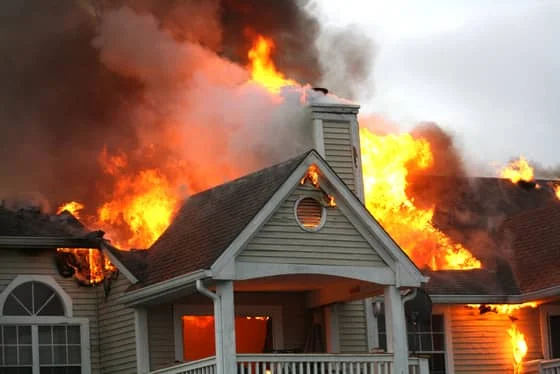Designed to protect you and your family, your fire alarm can be quite bothersome when it sounds without a clear explanation. A fire alarm going off for no reason can interrupt your day, create extra stress, and potentially result in indifference towards genuine threats. Nevertheless, these problems are frequently avoidable with adequate knowledge and upkeep.
This guide seeks to identify the reasons for a fire alarm going off for no reason and to furnish you with actionable maintenance tips to ensure its reliable functionality in critical situations.
Common Causes of False Alarms
Environmental Triggers
 Often, false alarms are a result of environmental factors you might not even notice.
Often, false alarms are a result of environmental factors you might not even notice.
- Smoke or Steam: Cooking smoke or steam from showers can easily set off sensitive sensors. Common culprits include overly smoky stovetops or bathrooms with poor ventilation.
- Dust or Debris: Old, dusty fire alarms act as magnets for particles, creating issues over time. When dust enters the internal components, it can trick the sensors into thinking there’s smoke.
- Pesky Intruders: Yes, you read that right. Tiny insects sometimes creep into the alarm casing, disturbing the internal mechanisms or setting off false detections.
Battery or Power Issues
Batteries play a pivotal role in your fire alarm’s reliability. Here’s how power issues can lead to false alarms:
- Low or Faulty Batteries: When batteries are nearing depletion, alarms generally produce repeated beeping or chirping sounds. Nevertheless, they can occasionally experience malfunctions that lead to false alarms.
- Power Surges: If your alarm is hardwired into your home’s electrical system, a power surge or flicker may disrupt its functionality.
Sensor Sensitivity
The sensitivity of your alarm plays a huge role in how often it reacts.
- Aging Sensors: As time passes, the sensors in your fire alarm might become excessively sensitive, detecting slight variations in the air that typically wouldn’t activate an alarm.
- Improper Placement: Alarms positioned near kitchens, fireplaces, or bathrooms are more prone to false activations since they are near smoke, steam, or varying humidity.
Key Maintenance Tips to Prevent False Alarms
Cleaning and Inspection
Dust and grime can disrupt your fire alarm’s performance, so keeping it clean is essential.
- Consistently vacuum or gently clean the alarm’s surface to eliminate settled dust and grime. Utilize a can of compressed air for careful interior cleaning (but review the manufacturer’s guidelines beforehand).
- Inspect the alarm for insect infestations, especially during warm months. If necessary, use insect-repellent strips designed for electronic devices.
Battery Maintenance
Most false alarms caused by battery issues are preventable with proper care.
- Make it a habit to replace your fire alarm batteries every six months—set a reminder if necessary!
- Test your alarm monthly by pressing the test button. This ensures it’s working correctly and helps you catch potential problems early.
Proper Alarm Placement
Where your alarm is located matters more than most people realize.
- Follow recommended installation guidelines—place alarms at least 10 feet away from stoves, ovens, and fireplaces to minimize false triggers.
- Avoid humid areas like just outside bathrooms, where steam can interfere with the alarm’s performance.
Upgrading Old Devices
Did you know fire alarms expire? Over time, their components degrade, leading to malfunctions.
- Replace your fire alarms every 7-10 years so you’re always protected by the latest technology.
- Consider interconnected systems that provide a synchronized alert across your home, offering modern convenience and added safety.
Troubleshooting Steps When False Alarms Occur
Even with proper maintenance, false alarms can still happen occasionally. Here’s how to address them effectively.
Immediate Action
When your alarm goes off unexpectedly, start with these quick fixes:
- Reset the alarm following the manufacturer’s instructions.
- Check for nearby triggers like smoke, steam, or recent cleaning sprays.
Deep Investigation
If a reset doesn’t resolve the issue, look deeper.
- Open the unit and inspect for dust, debris, or small insects.
- Swap in fresh batteries, even if the old ones don’t appear dead.
- Evaluate whether the alarm’s location might be the problem—try relocating it farther from potential triggers.
When to Seek Professional Help
Some issues require expert intervention.
- If you’ve tried all the steps above and the problem persists, contact a professional installer or electrician.
- Seek a replacement unit if your alarm shows consistent malfunctions despite troubleshooting.
Stay Safe by Staying Proactive
False alarms can indeed be irritating; however, they are a minor sacrifice for the life-saving advantages provided by a well-functioning fire alarm. By understanding the prevalent triggers of a fire alarm going off for no reason and committing to consistent maintenance, one can minimize unnecessary worry and ensure the alarm is operational when it is most crucial.
From proper placement to timely upgrades, these simple tips can help ensure your safety and peace of mind at home. Don’t wait for another false alarm—start your fire alarm care routine today to prevent catastrophic events that might force you into selling a fire-damaged house.

